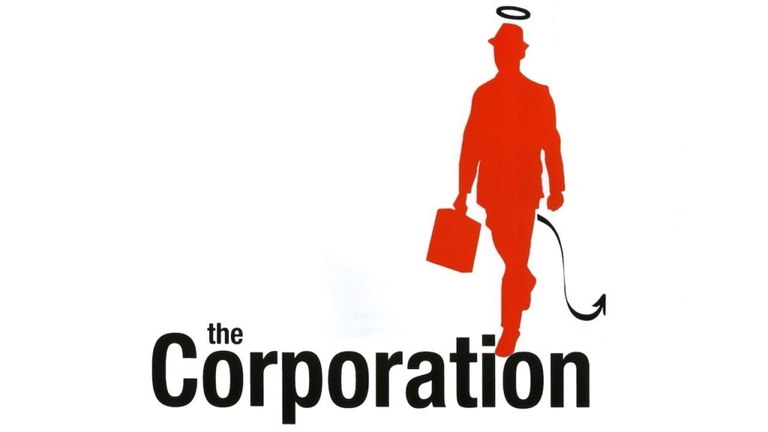
The Corporation is a 2003 Canadian feature film presentation that was directed by Mark Achbar and Jennifer Abbott based on the book written by University of British Columbia law professor Joel Bakan, The Corporation: The Pathological Pursuit of Profit and Power. A sequel to the film entitled “The New Corporation: The Unfortunately Necessary Sequel was released this year, 2020.

Image Source: Click Here
What started off as a relatively unknown institution 150 years ago, The Corporation is now as pervasive as many of the many institutions we hold dearly in our society like the churches, the governments, the educational institutions, etc.
In the documentary, the corporation was described as an artificial creation where a group of individuals work together to serve a variety of objectives which for most primarily means earning profit that is legal and sustainable for the people who own the business.
The Legal Person
The film described the the early years of the corporation as beginning in the era of the industrial revolution. While the corporation was seen as a gift by the public that aims to serve the good of the people; as the industry grew, the corporation was seen as an entity that needed more power to operate so that it can continue to serve the majority by removing constraints that were initially placed in a corporation. Corporate lawyers used the 14th Amendment to argue that a corporation can have the same rights as that of an individual - the power to own, buy and sell property, borrow money, and own and manage a business – and, the corporation won.
The Corporate Personality
The documentary then moves on to describe the kind of ‘person’ the corporation is. Unlike humans who are governed by values and morality, the corporation is described as an entity without moral ascendancy and only cares about the bottom line. In fact, the film tells its audience that the primary objective of the corporation as an entity that is required by law is to place the financial interest of its owners above competing interests.
As the movie progresses, a deep dive on the psyche of the corporation as a legal person was made using the Personality Diagnostic Checklist of the World Health Organization ICD 10 on Manual of Mental Disorders. It is interesting to note that by the end of the elaborate analysis with case studies as examples, the diagnosis of the corporation’s personality is determined as having a mental disorder linked to psychopathy.
The Conflict
The CEOs interviewed by the film argues that there is essentially a difference between the intentions of the individual members versus that of the organization as a whole. While the CEO can be of high moral standard, well-liked, and principled, the position’s limited power is usually overshadowed by the corporate agenda, which is primary interested in substantial increase in revenue. While decisions may be influenced by business executives, the shareholders interest will always come first, and usually that interest is solely focused on improving the profit margins or bottom line. This interest is usually inconsiderate of impact to stakeholders, the society, even the environment.
Perception Management
As more and more scandals and issues were unearthed, corporations began to increasingly consider the impact of perception management. The brand image became an important commodity that corporations started to explore and leverage on. Studies and researches were made to determine the behaviour of customers, the market, and how business strategy can exploit these behaviours to further increase the amount of profit made off from sale of a product. Several case studies were shared that showed how the psychology of market is used to influence the buying behaviour of people by strategically using brand image even brand placement to create the illusion of need to buy certain products – even if these products are not at all essential, and in some instances possibly dangerous e.g. the case of Monsanto’s milk.
Corporate Social Responsibility
As business owners and people become more aware of the power of corporations and the dangers linked to its unregulated behaviour, more and more have started to consider the importance of corporate social responsibility and its role in ensuring that businesses are responsible, empathic, and have genuine care for the need of community members and environment.
The Challenge
There are more global companies nowadays, with powers that exceed those of courtries even governments, making regulations more complex and challenging. The film has shown the horrors of how the untempered power of the corporation can bring pain that can harm many even kill – as businesses become global, these powers will increase and regulating it will become more challenging.
It is therefore up to those who are aware – the target audience of the documentary film, the activists, to not waver but continue to police and provide the important checks and balances to ensure that abuses are exposed and reported, and that corrective and preventive measures are in place so that further abuse are eliminated.
Source:
Posted from my blog with SteemPress : https://pinoyviajero.blog/the-corporation-film-analysis/
Congratulations @pinoy.viajero! You have completed the following achievement on the Hive blockchain and have been rewarded with new badge(s) :
You can view your badges on your board and compare yourself to others in the Ranking
If you no longer want to receive notifications, reply to this comment with the word
STOP